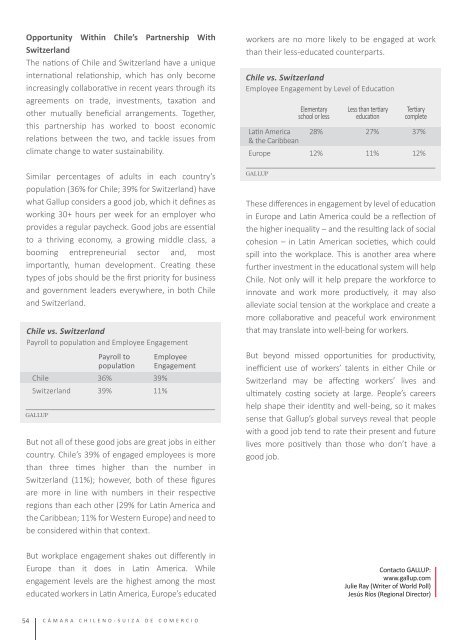OPORTUNIDADES Y NEGOCIOS CHILE - SUIZA
1LbZnc5
1LbZnc5
Create successful ePaper yourself
Turn your PDF publications into a flip-book with our unique Google optimized e-Paper software.
Opportunity Within Chile’s Partnership With<br />
Switzerland<br />
The nations of Chile and Switzerland have a unique<br />
international relationship, which has only become<br />
increasingly collaborative in recent years through its<br />
agreements on trade, investments, taxation and<br />
other mutually beneficial arrangements. Together,<br />
this partnership has worked to boost economic<br />
relations between the two, and tackle issues from<br />
climate change to water sustainability.<br />
workers are no more likely to be engaged at work<br />
than their less-educated counterparts.<br />
Chile vs. Switzerland<br />
Employee Engagement by Level of Education<br />
Elementary<br />
school or less<br />
Less than tertiary<br />
education<br />
Tertiary<br />
complete<br />
Latin America 28% 27% 37%<br />
& the Caribbean<br />
Europe 12% 11% 12%<br />
Similar percentages of adults in each country’s<br />
population (36% for Chile; 39% for Switzerland) have<br />
what Gallup considers a good job, which it defines as<br />
working 30+ hours per week for an employer who<br />
provides a regular paycheck. Good jobs are essential<br />
to a thriving economy, a growing middle class, a<br />
booming entrepreneurial sector and, most<br />
importantly, human development. Creating these<br />
types of jobs should be the first priority for business<br />
and government leaders everywhere, in both Chile<br />
and Switzerland.<br />
Chile vs. Switzerland<br />
Payroll to population and Employee Engagement<br />
Payroll to<br />
population<br />
Chile 36% 39%<br />
Switzerland 39% 11%<br />
Employee<br />
Engagement<br />
But not all of these good jobs are great jobs in either<br />
country. Chile’s 39% of engaged employees is more<br />
than three times higher than the number in<br />
Switzerland (11%); however, both of these figures<br />
are more in line with numbers in their respective<br />
regions than each other (29% for Latin America and<br />
the Caribbean; 11% for Western Europe) and need to<br />
be considered within that context.<br />
But workplace engagement shakes out differently in<br />
Europe than it does in Latin America. While<br />
engagement levels are the highest among the most<br />
educated workers in Latin America, Europe’s educated<br />
These differences in engagement by level of education<br />
in Europe and Latin America could be a reflection of<br />
the higher inequality – and the resulting lack of social<br />
cohesion – in Latin American societies, which could<br />
spill into the workplace. This is another area where<br />
further investment in the educational system will help<br />
Chile. Not only will it help prepare the workforce to<br />
innovate and work more productively, it may also<br />
alleviate social tension at the workplace and create a<br />
more collaborative and peaceful work environment<br />
that may translate into well-being for workers.<br />
But beyond missed opportunities for productivity,<br />
inefficient use of workers’ talents in either Chile or<br />
Switzerland may be affecting workers’ lives and<br />
ultimately costing society at large. People’s careers<br />
help shape their identity and well-being, so it makes<br />
sense that Gallup’s global surveys reveal that people<br />
with a good job tend to rate their present and future<br />
lives more positively than those who don’t have a<br />
good job.<br />
Contacto GALLUP:<br />
www.gallup.com<br />
Julie Ray (Writer of World Poll)<br />
Jesús Ríos (Regional Director)<br />
El ranking formulado por Adecco, la escuela de<br />
negocios francesa Insead y el Human Capital<br />
Leadership Institute, miden la capacidad de<br />
atracción, desarrollo y retención del talento en 93<br />
naciones, situando a los chilenos en el puesto 27 a<br />
nivel mundial.<br />
La segunda versión del Índice Global de<br />
Competitividad del Talento (GTCI), elaborado por el<br />
Grupo Adecco, junto a Insead y el Human Capital<br />
Leadership Institute, ubicó a Suiza en el primer lugar<br />
de dicho ranking, mientras que Chile logró el primer<br />
puesto en Latinoamérica.<br />
El GTCI mide la capacidad que presentan diversas<br />
naciones para gestionar el talento a través de la<br />
atracción, crecimiento y retención de éste,<br />
evaluando y comparando a 93 países.<br />
Dentro de las variables investigadas, Chile destaca en<br />
la actividad empresarial de nuevos productos,<br />
COMPETITIVIDAD DEL TALENTO<br />
<strong>SUIZA</strong> LIDERA ÍNDICE GLOBAL, <strong>CHILE</strong> OBTIENE<br />
EL PRIMER LUGAR EN LATINOAMÉRICA<br />
inversión extranjera y sostenibilidad. A su vez, los<br />
resultados más bajos obtiene en exportación de<br />
habilidades profesionales y en el ingreso de<br />
estudiantes internacionales. Entre los aspectos<br />
positivos presentes en el caso de Suiza, están la<br />
estabilidad política, calidad de las escuelas y<br />
desarrollo continuo en la formación del personal.<br />
Tras Suiza, quienes obtienen el segundo y tercer<br />
lugar del ranking son Singapur y Luxemburgo,<br />
respectivamente. En Latinoamérica, Costa Rica (38) y<br />
Panamá (42) fueron los dos primeros países que<br />
siguieron a Chile, posicionando éste último como un<br />
indiscutido líder de la zona, ubicándose once puestos<br />
sobre la nación que obtuvo el segundo lugar de dicho<br />
sector.<br />
Para el estudio completo,<br />
consultas@adecco.cl o www.adecco.cl<br />
54 CÁMARA <strong>CHILE</strong>NO-<strong>SUIZA</strong> DE COMERCIO<br />
1 9 5 5 | Y E A R B O O K | 2 0 1 5 55


